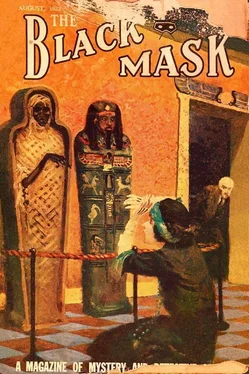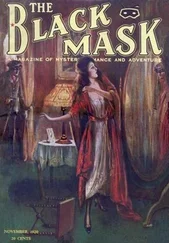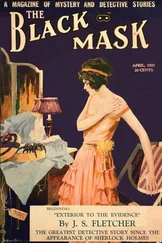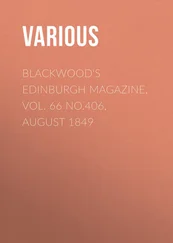John Baer - The Black Mask Magazine (Vol. 5, No. 5 — August 1922)
Здесь есть возможность читать онлайн «John Baer - The Black Mask Magazine (Vol. 5, No. 5 — August 1922)» весь текст электронной книги совершенно бесплатно (целиком полную версию без сокращений). В некоторых случаях можно слушать аудио, скачать через торрент в формате fb2 и присутствует краткое содержание. Город: New York, Год выпуска: 1922, Издательство: Pro-Distributors Publishing Company, Жанр: Детектив, на английском языке. Описание произведения, (предисловие) а так же отзывы посетителей доступны на портале библиотеки ЛибКат.
- Название:The Black Mask Magazine (Vol. 5, No. 5 — August 1922)
- Автор:
- Издательство:Pro-Distributors Publishing Company
- Жанр:
- Год:1922
- Город:New York
- ISBN:нет данных
- Рейтинг книги:4 / 5. Голосов: 1
-
Избранное:Добавить в избранное
- Отзывы:
-
Ваша оценка:
- 80
- 1
- 2
- 3
- 4
- 5
The Black Mask Magazine (Vol. 5, No. 5 — August 1922): краткое содержание, описание и аннотация
Предлагаем к чтению аннотацию, описание, краткое содержание или предисловие (зависит от того, что написал сам автор книги «The Black Mask Magazine (Vol. 5, No. 5 — August 1922)»). Если вы не нашли необходимую информацию о книге — напишите в комментариях, мы постараемся отыскать её.
The Black Mask Magazine (Vol. 5, No. 5 — August 1922) — читать онлайн бесплатно полную книгу (весь текст) целиком
Ниже представлен текст книги, разбитый по страницам. Система сохранения места последней прочитанной страницы, позволяет с удобством читать онлайн бесплатно книгу «The Black Mask Magazine (Vol. 5, No. 5 — August 1922)», без необходимости каждый раз заново искать на чём Вы остановились. Поставьте закладку, и сможете в любой момент перейти на страницу, на которой закончили чтение.
Интервал:
Закладка:
The situation appealed to Bruckner. He needed a rest and a change of clime, and a stay by the sea would be welcome. It would do him good and build up his health while he planned how to break down hers. So he mentioned to the widow as much of his plan as was fitting for the lady to know. She proved entirely agreeable — even eager, Bruckner thought. In fact, he was rather afraid that she was in love with him. That might prove awkward, but it could not be helped. So he married her and took a solemn oath that when this adventure was over, he would never again tempt fate.
The bungalow was on a little sandy point, some miles from the nearest town and the railroad station. Mrs. Bruckner, née Corcoran, taxied back and forth from the village in her motorboat when her fancy suggested such journeys or purchases required them. Bruckner spent much of his time sitting on the beach with his pipe and his thoughts, and practically lived the life of a married hermit. They got on together beautifully, and Bruckner thanked his stars that the woman did not desire him to be eternally complimenting and petting her. Her sole aim was his comfort, and never in all of his thirteen marital ventures had he lived so pleasantly and contentedly. It almost seemed a shame to terminate such an ideal arrangement. In fact, it would be little short of a crime.
IV
But just as he knew he would, Bruckner reverted to type. He simply could not resist the temptation to kill the woman. She did not annoy him. He had nothing against her, and he did not wish her money. Just the same he wanted to kill her, and he wanted to do it in some new and original way.
For days he thought it over, and grew more perplexed with the passage of the time. He could not sleep at night, and he found himself nervous and restless. His appetite began to fail — a condition unheard of before — and even his pipe and tobacco failed to solace him. Once or twice he wondered whether it would not be wise if he went out and got drunk. He vetoed that idea, however, for he had always made it a rule to keep his head clear and his brain unfuddled. Drunken men and women, Bruckner always said, are inclined to talk too much — and he was a man of silence. Besides, the hooch lately available, had, in cases, proved fatal.
During all of his meditation and perplexity, Mrs. Bruckner remained in blissful ignorance of the thing which was troubling him. It was true that she seemed to suspect that something was wrong, but when she pressed for an explanation, he naturally put her off. She appeared to be alarmed about his health, and was constantly urging him to go and consult a physician. He flatly refused, and told her he had never been sick in his life. Of course he knew what was the matter, and also knew very well that no physician’s prescription would cure his ailment.
His wife made more frequent trips to the little village, and even went to New York to bring back dainty viands to tempt his appetite. Apparently her sole ambition in life was to prepare a dish that would tickle his palate, and Bruckner was not without some appreciation of her kindness and concern. At times, he almost resolved to put away his idea and let the woman live. But impatience to have it over with, and to be at peace with the world, mastered him at last.
His intentions crystallized into action on the morning when she announced her intention of going over to Calder’s Point to attend a pinochle party. Bruckner never played cards and said that he would not go. However, he even urged that she indulge in this pleasant diversion.
“You stay around me too much,” he pressed her tenderly. “You’re wearing yourself out looking after my health. Stop worrying, and have a good time while you may — I mean while you’re still young and have your health,” he added, realizing that he had almost made an unfortunate slip.
“All right, I will — if you really don’t mind,” she agreed, and explained that the party would occur on the following Monday night. She proposed to take the motorboat over, leaving at seven o’clock; remain for the night, and chug-chug back again the following morning.
Bruckner was delighted. A sudden inspiration had plunged him into an ecstasy of joy. At last — like a bolt from the blue — he had hit upon a plan to do away with the woman. It was entirely possible that the thing had been done before, but it was new with Bruckner. It could not possibly savor of design and it would happen while she was away. He would be presumed to know nothing of the accident until the heartrending news should be brought to him. Then he would be stunned. Bruckner was a past master at registering grief — surprise — anguish.
But after the funeral he could spend the entire summer at the bungalow in undisturbed peace. He was glad that he could accomplish his purpose so early in the spring, for unlike the average man, his thoughts did not lightly turn to love in that entrancing period.
The thought necessitated a visit to his friend, the clockmaker to the former Czar. He made it, and outlined his needs minutely. That is, he told the clockmaker precisely the sort of box he desired — how long and how wide it should be — and explained just how its timepiece was to be set. It was to be put up in a candy box and tied neatly with ribbon. It should weigh five pounds and bear the wrapping of a smart confectioner. On the day he meant to use it, Bruckner would call for the box. It must be ready, and everything must be fixed so that he would not need to unwrap it.
Mrs. Bruckner was going away in her little sea-taxi at seven o’clock. He would arrive from the city an hour before. He planned to reach the bungalow via a hired launch, timing himself to get there a little late for supper, but in time to bid her good-bye. When he did so he would thoughtfully put the candy box in his wife’s motorboat, calling her attention to it, and laughingly instructing her not to nibble at its contents during the journey. He wished her to save it for the party and present it to her hostess.
He hoped she would obey. The trip would take her a little more than an hour. She did not mind that, since she loved the sea and could handle her craft as well as any man. But if everything went well, Mrs. Bruckner would never land at the wharf at Calder’s Point. Just about fifteen minutes before she was due to reach that settlement, the little clock would tick its final tick, and Mrs. Bruckner would proceed to eternity instead of the pinochle party.
The complete simplicity of the scheme appealed to him strongly. He would put the bomb near the gasoline tank. Its explosion would destroy that container and everyone would surmise that the blowing up of the fuel store had caused the tragedy. No one but the dead woman would know about the candy box — that is, no one but the clockmaker of the Czar. That gentleman would not be likely to speak. Secrecy was also essential to the success of his profession, and in such matters he was strictly honorable and thoroughly reliable. He need not know for whom the box was intended and for reasons of his own he would not inquire too deeply into the matter.
V
Everything went as planned. On Monday. morning Mr. Bruckner announced that it would be necessary for him to go to the city in connection with some business at his broker’s. He promised to return as speedily as he could, but told his wife not to wait for him if he should not be home by the time she intended to leave. That was camouflage, carefully planned. He always thought of little details like that in order to turn away suspicion from the minds of his victims. Besides, he wanted to establish an alibi and have it known that he was away all day.
Moreover, he always disliked to be around his victims just before the climax of his cunning. Their very confidence and trust in him always tended to annoy him. But he knew very well that he would be back on time. Otherwise, of course, he could not place the candy box in the little launch.
Читать дальшеИнтервал:
Закладка:
Похожие книги на «The Black Mask Magazine (Vol. 5, No. 5 — August 1922)»
Представляем Вашему вниманию похожие книги на «The Black Mask Magazine (Vol. 5, No. 5 — August 1922)» списком для выбора. Мы отобрали схожую по названию и смыслу литературу в надежде предоставить читателям больше вариантов отыскать новые, интересные, ещё непрочитанные произведения.
Обсуждение, отзывы о книге «The Black Mask Magazine (Vol. 5, No. 5 — August 1922)» и просто собственные мнения читателей. Оставьте ваши комментарии, напишите, что Вы думаете о произведении, его смысле или главных героях. Укажите что конкретно понравилось, а что нет, и почему Вы так считаете.












